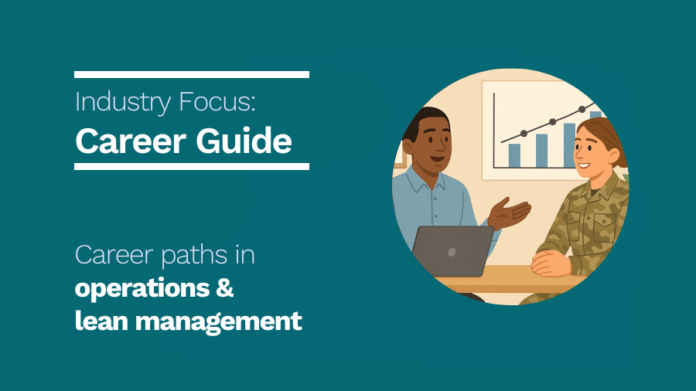Operations and lean management may not always make headlines, but they’re the unseen engines that keep businesses running. From warehouses and supply chains to manufacturing plants and NHS facilities, operational excellence is a constant requirement – and former service personnel are particularly well-suited to deliver it
With military backgrounds in logistics, process adherence, maintenance, and personnel coordination, many veterans transition into operations roles with ease. The structured, disciplined thinking found in the Forces often mirrors the lean, efficient, and safety-conscious environments sought in civilian organisations.
What is operations and lean management?
Operations refers to the internal workings of an organisation – how goods and services are produced, distributed, and maintained. Lean management is the continuous pursuit of efficiency: removing waste, streamlining systems, and ensuring consistent quality.
It’s a practical, hands-on field focused on process and performance. While it overlaps with other areas like logistics and facilities, its core is about ensuring things run as they should – safely, efficiently, and reliably.
Where can veterans fit in?
Operations and lean management roles exist in every sector, but some stand out for their strong alignment with military experience:
- Logistics and warehousing – The UK’s logistics industry supports 200,000 businesses and over 2.5 million jobs, with warehouse and distribution centres at its heart.
- Manufacturing and production – Whether in automotive, defence, food, or electronics, these environments prioritise structure, consistency, and health and safety.
- Facilities and estates – Many veterans move into roles ensuring the day-to-day running of buildings, equipment, and security systems.
- Transport and distribution – Roles across freight, rail, ports, and utilities require people who can follow protocols, optimise routes, and maintain schedules.
- Healthcare and public services – Operational roles in the NHS and local authorities often involve managing resources, shift patterns, and equipment stocks – ideal for those with planning and coordination experience.
Roles to consider
While project management is often discussed separately, there is a rich landscape of operational jobs where veterans can thrive without necessarily overseeing large-scale change initiatives. These include:
- Operations supervisor – Oversees routine work on factory floors, warehouses, or service delivery environments.
- Logistics technician or coordinator – Handles inventory, delivery schedules, and movement of goods using familiar protocols.
- Facilities or maintenance operative – Keeps buildings, systems, and equipment in safe, working order.
- Process improvement assistant – Supports continuous improvement activities using Lean principles.
- Shift or team leader – Manages day-to-day activity on production lines, in catering or accommodation services, or in warehouse environments.
- Transport and fleet coordinator – Ensures vehicle readiness, route planning, and compliance with regulations.
- Compliance and quality technician – Monitors outputs to meet safety, hygiene, or regulatory standards.
Why employers want military experience
Employers in operations often say they struggle to find reliable, safety-aware, and adaptable staff. Former military personnel typically tick all those boxes – and more:
- Discipline and reliability – Veterans are used to showing up on time, following procedures, and getting the job done.
- Situational awareness – Operational roles require people who notice issues before they become problems.
- Risk assessment and safety – Familiarity with health and safety, audits, inspections, and checks is highly valued.
- Process focus – Ex-Forces individuals are used to repeatable systems and working within tight tolerances.
- Team coordination – Operations are rarely solo efforts, and veterans know how to work as part of a cohesive team.
Lean thinking: a natural fit
Lean methodologies focus on eliminating unnecessary steps and delivering consistent value. For anyone with experience in optimising kit, supplies, or workflows in the Forces, Lean Six Sigma training can be a powerful add-on.
Courses start at Yellow Belt and go up to Black Belt level, with certifications widely respected across industries such as manufacturing, logistics, healthcare, and services.
Resettlement training and Enhanced Learning Credits (ELC)
You can use your ELCs to gain qualifications that build on your military experience and open doors into operational careers. Popular options include:
- Lean Six Sigma (Yellow, Green, or Black Belt)
- Chartered Institute of Logistics and Transport (CILT) courses
- Institute of Workplace and Facilities Management (IWFM) qualifications
- IOSH Managing Safely and NEBOSH General Certificate
- Warehouse, forklift, and transport management courses
- Facilities maintenance and service delivery diplomas
These qualifications, combined with on-the-ground experience, can give you a clear edge in the civilian job market.
Who can help you?
A number of organisations and initiatives offer targeted support for veterans entering the world of operations:
- MOD Career Transition Partnership (CTP) – Offers job-matching and training support.
- Forces in Mind Trust – Funds research and support to improve transition outcomes.
- SaluteMyJob – Offers Lean Six Sigma training and civilian pathways.
- Logistics UK – Provides sector-specific advice and insight into employment routes.
- BuildForce – Although construction-focused, offers operational training for site logistics and FM roles.
In summary
Operations and lean management are perfect landing zones for ex-Forces personnel who want to apply their skills without going into formal project roles. From the frontline of warehouses to the control rooms of utilities and transport hubs, these roles need people who are dependable, process-driven, and used to working under pressure.
With the right qualifications and support, your experience can translate into a long and rewarding second career.
Want the latest news straight to your inbox? Subscribe to our free weekly newsletter!
Interested in sales, marketing or business skills courses and training? Check out our training partner, Learning Room.

